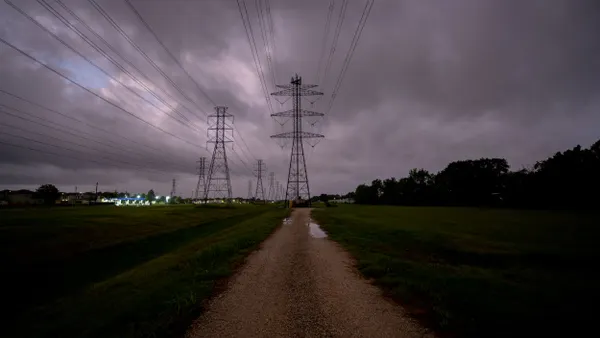Dive Brief:
- The PJM Interconnection, independent power producer and clean energy trade groups, and other organizations are urging the Federal Energy Regulatory Commission to dismiss a complaint that seeks a re-do of the grid operator’s last capacity auction.
- The complaint from ratepayer advocates would violate the “filed-rate doctrine,” which bars retroactive rates, and would create market uncertainty, PJM told FERC on Monday. “Entertaining the complaint would signal to all investors in commission-regulated markets that they cannot rely on any clearing price, as they would become at risk for adjustment at any time,” PJM said.
- The complaint to overturn PJM’s last capacity auction was supported by the New Jersey Board of Public Utilities, the Office of the People’s Counsel for the District of Columbia, the Illinois Citizens Utility Board and Northern Virginia Electric Cooperative, according to filings at FERC.
Dive Insight:
In PJM’s last capacity auction in July, total capacity costs jumped to $14.7 billion from $2.2 billion in the previous auction. Those costs will increase some utility customer bills by as much as 20% starting June 1.
In support of the complaint, the New Jersey BPU said FERC should at a minimum investigate whether the auction was manipulated by market participants’ withholding capacity. “To ensure market-based tariffs are just and reasonable, the Commission must conduct ongoing oversight to verify that market outcomes genuinely reflect competitive principles,” the BPU said.
The filed-rate doctrine may not apply in this case, according to the BPU. “If a past action illegally manipulated the market, then that past action is illegal, and the only logical legal consequence of that action is an unjust and unreasonable rate that must be overturned,” the utility board said.
Southern Maryland Electric Cooperative also called for an investigation by FERC.
PJM and consumer advocates are both in a difficult position, according to a joint filing from the Solar Energy Industries Association, the National Hydropower Association, the American Clean Power Association, Advanced Energy United and the Mid-Atlantic Renewable Energy Coalition.
“Increased load growth and external forces including siting, permitting, and supply chain constraints have strained the current market with significant consequences for both consumers and investors,” they said.
Instead of re-running the capacity auction, PJM should make market reforms, according to the trade groups. “Well-functioning markets provide the investment signals needed to ensure resource adequacy and reliability,” the groups said. “The [consumer advocates’] proposal would not resolve the underlying issues that are causing market volatility and instead would artificially suppress investment incentives, prolonging the very issues PJM should fix.”
In asking FERC to reject the complaint by August, PJM cited a March 2024 U.S. Court of Appeals for the Third Circuit ruling that overturned a FERC decision approving a change to the grid operator’s capacity market rules in the middle of a previous auction.
The court found that “a party cannot successfully challenge the clearing prices that result from application of the auction rules when the calculation of such auction results are consistent with the tariff rules,” PJM said.
The results of the July capacity auction were driven by tightening power supplies, according to PJM. Only 20.7 MW of capacity that was offered across the grid operator’s footprint did not clear the auction while there wasn’t enough capacity in the Baltimore Gas and Electric and Dominion Virginia Electric Power zones to meet reliability requirements, PJM said.
Constellation Energy Generation said the company is sympathetic to the auction’s consumer impacts, but “upending market results and retroactively adjusting market rules upon which participants relied is not the solution.”
Early indications are that the market is beginning to respond to the 2025/26 auction’s price signal, with the owners of more than 1 GW of generating resources deciding to reverse their decisions to retire their power plants, according to Constellation.
The PJM Power Providers Group and the Electric Power Supply Association, Shell Energy North America, Buckeye Power and East Kentucky Power Cooperative, Enerwise Global Technologies, which operates as CPower, also asked FERC to reject the complaint.















